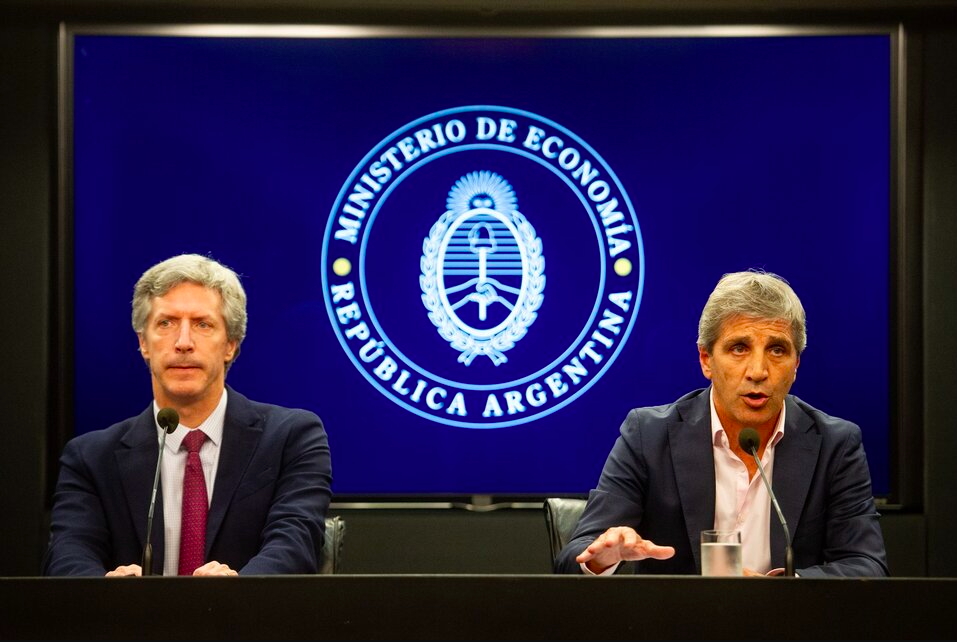
Published 01/15/2024 18:59 | Edited 01/15/2024 19:12
The announcement of the agreement with the International Monetary Fund (IMF), which foresees the disbursement of US$4.7 billion, was received with relief, avoiding a possible Argentine default. He offers a temporary breather to Argentine Economy Minister Luis Caputo. However, this amount is far from Caputo’s initial expectations, who expected a more substantial contribution to face imminent financial challenges.
Last week, Argentina reached new targets with the IMF, but achieving these objectives will require rigorous tightening not only in social programs, but also in the productive sectors. The measures adopted will generate popular dissatisfaction, increasing antipathy towards the entity and providing ammunition to the opposition. In reality, the Milei government’s movement in Congress is even more depressing for Argentines’ income than the IMF’s demands. But both confirm each other towards the massacre that is promised to workers, their consumption capacity and jobs.
Milei’s stabilization plan aims to increase net foreign exchange reserves, but critics point to uncertainty regarding the implementation of the proposed reforms. Caputo’s urgency is evident, as the lack of dollars has become one of the Argentine government’s main weaknesses.
Buenos Aires’ attempt to bring forward all disbursements planned by the IMF until the end of the agreement was unsuccessful, resulting in an immediate disbursement of around half of the requested amount. The US$4.7 billion will mainly be used to pay capital dues under the 2018 stand-by agreement and to cancel a CAF loan granted in December.
While these resources are not directly available to the Central Bank or Treasury, they temporarily ease the country’s debt commitments for the first quarter, reducing pressure on Caputo and his team.
Caputo’s management in the currency area will be crucial, as he needs to balance the supply of dollars, keeping exports and imports functioning, while facing internal political pressures that threaten to destabilize the economy. Political conflicts can become an additional challenge in maintaining the delicate exchange rate balance.
Promised beatings
Presidency spokesman Manuel Adorni said this morning that the Government “is analyzing as a certain possibility” discounting the day to workers who join the national strike that the CGT, the two CTA and the social movements will carry out on the 24th of January. The measure of force will take place on that day from 12 noon in rejection of the DNU adjustment measures and the omnibus law. The statements add to a series of threats from the Government against the protest called by the union confederations.
To achieve the ambitious goal of obtaining a primary surplus of 2% of GDP in 2024, Javier Milei’s government announced taxes on exports and imports, in addition to cuts in state support programs for small and medium-sized companies. This decision contrasts with the previous target of zeroing the primary deficit in 2024.
Milei’s ultra-right government is seeking an adjustment in public accounts without considering the social impact, which could result in serious consequences for workers and entrepreneurs.
Taxation on exports and imports, together with the reduction of development programs, raises concerns about the impact on national production. There should likely be a drop in consumption, increased unemployment and flattened wages.
The proposed adjustment, including cuts in public works spending and subsidies, will negatively affect the country’s productive structure. Taxation on foreign trade can generate friction with the agro-export sector, complicating the goal of restoring international reserves.
The goal of accumulating US$10 billion in liquid reserves by the end of the year also faces challenges. The political fragility of the government, with a small bench in the Legislature, will make it difficult to approve unpopular measures that are fundamental to the agreement with the IMF.
IMF communications director, Julie Kozak, highlighted the importance of political support to move forward with the reform package, including the Law of Bases and Starting Points for the Freedom of Argentines, known as the “Bus Law”. The IMF, rather than offering a direct financial or economic solution, brought strong political support to the Argentine government. The laudatory tone of the technical mission’s final communiqué highlights the current management and attributes responsibilities to the previous government. Caputo takes advantage of this narrative to justify the debt incurred as a result of excessive spending.
Before the agreement with the IMF, there were attempts to obtain external financing, including through international organizations. However, these initiatives failed, leaving Caputo with few options to secure a significant injection of dollars into the economy. One government strategy is centered on the expectation of dollars from a bumper harvest in April. However, managing importers’ debt and controlling the difference between the official dollar and “liquid money” are persistent concerns.
Argentina faces a challenging scenario, where the search for economic stability collides with social and political issues. The success in implementing the proposed measures will determine not only the relationship with the IMF, but also the country’s economic and political trajectory in the coming months.
Source: vermelho.org.br

